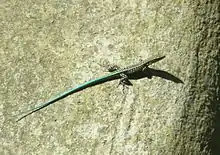Natural history of Rhodes
The natural history of the island of Rhodes is determined by its geographic position, climate and geological diversity. Rhodes is in the Eastern Mediterranean Basin close to the coast of Turkey, and the flora and fauna are a mixture of Mediterranean and Asian elements. Rhodes is in the Eastern Mediterranean conifer-sclerophyllous-broadleaf forests Ecoregion.
The habitats are: arable land; perennial crops, orchards and groves, ruderal land; coastline and coastal rocky areas, inland cliffs, sea cliffs and rocky shores: forest, native coniferous woodland; grassland steppes and dry calcareous grassland; shrub land, sclerophyllous scrub, garrigue and maquis shrubland; wetland, rivers and streams.
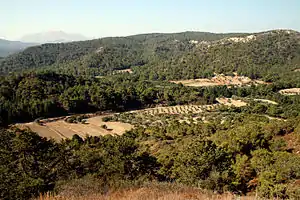
Flowering plants
The flowering plant species of Rhodes number 1,243.
.JPG.webp)
Phrygana or spiny garrigue
Phrygana or garrigue is open dwarf scrub dominated by low, often cushion-shaped, spiny shrubs. The phryganic species are high-temperature and drought tolerant, and they grow at low altitudes, usually on poor and rocky limestone and siliceous substrates.
The most common phryganic species on Rhodes are: Sarcopoterium spinosum, Cistus incanus, Cistus salviifolius, Phlomis fruticosa, Salvia triloba, Quercus coccifera, Asparagus acutifolius, Genista acanthoclada, Euphorbia acanthothamnos and Pistacia lentiscus.
Other species include Coridothymus capitatus, Thymus sp., Hypericum empetrifolium, Salvia triloba, Erica manipuliflora, Calicotome villosa, Ballota acetabulosa, Asphodelus aestivus
Bulbous plants
Many bulbous plants on Rhodes flower in the month of October. Species include Sternbergia lutea, Colchicum cupanii, Cyclamen graecum, Drimia maritima (late summer) and Narcissus serotinus. Notable are Colchicum macrophyllum, Fritillaria rhodia, Tulipa saxatilis.
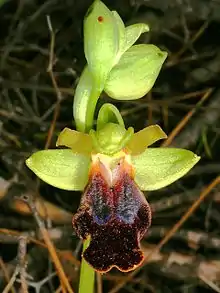
Orchids
Rhodes has a high diversity of orchid species, especially in the genus Ophrys: Ophrys apifera, Ophrys bombyliflora, Ophrys ciliata, Ophrys regis-ferdinandii, Ophrys cretica, Ophrys ferrum-equinum, Ophrys mammosa, Ophrys lutea, Ophrys sicula, Ophrys reinholdii, Ophrys tenthredinifera, Ophrys umbilicata, Ophrys umbilicata, Ophrys fusca, Ophrys omegaifera, Ophrys iricolor, Ophrys candica, Ophrys holosericea, Ophrys heldreichii, Ophrys dodekanensis, Ophrys oestrifera, Ophrys speculum, Serapias bergonii, Serapias carica, Serapias parviflora, Himantoglossum comperianum, Himantoglossum robertianum (= Barlia robertiana), Anacamptis collina, Anacamptis laxiflora, Anacamptis morio, Anacamptis papilionacea, Anacamptis pyramidalis, Anacamptis sancta, Anacamptis fragrans, Anacamptis palustris, Anacamptis coriophora, Orchis anatolica, Orchis anthropophora, Orchis italica, Orchis provincialis, Orchis punctulata, Orchis simia, Orchis lactea, Neotinea intacta, Neotinea lactea, Dactylorhiza romana, Spiranthes spiralis, Limodorum abortivum, Cephalanthera epipactoides, Cephalanthera longifolia and Neotinea maculata.
Other plants
Among the Mediterranean endemic species prominent in the Rhodes vegetation are the Aleppo pine, stone pine, Mediterranean cypress, bay laurel, Oriental sweetgum, holm oak, kermes oak, strawberry tree, Greek strawberry tree, mastic, terebinth, common myrtle, oleander, Acanthus mollis, Vitex agnus-castus, Valerianella coronata. Nearly endemic to the Mediterranean genera found on Rhodes are Aubrieta, Sesamoides, Cynara, Dracunculus, Arisarum and Biarum.
More widespread in South-east Europe and Asia Minor plants include Ranunculus asiaticus, Tamarix parviflora, Petrorhagia dubia, Heliotropium europaeum, Centranthus calcitrapae and Globularia alypum.
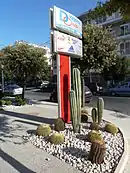
Widely-grown introduced plants
These include Bougainvillea, Acacia, Agave, Artemisia, Calendula, Clematis, Eucalyptus, Fuchsia, Hydrangea, Impatiens, Jacaranda, Jasmine, Magnolia, Melissa, Pelargonium, and Salvia.
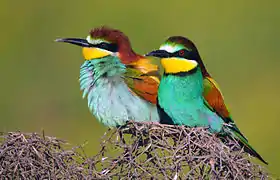
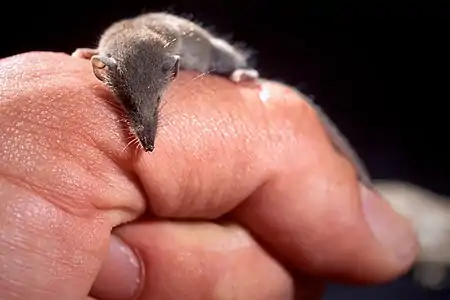
Birds
257 bird species are recorded from Rhodes, many are passage migrants. 80 are breeding species.
Breeding species include Alectoris chukar, Burhinus oedicnemus, Otus scops, Apus melba, Apus pallidus, Merops apiaster, Upupa epops, Calandrella brachydactyla, Hirundo daurica, Anthus campestris, Cercotrichas galactotes, Oenanthe hispanica, Phalacrocorax aristotelis, Ixobrychus minutus, Buteo rufinus, Hieraaetus fasciatus, Circaetus gallicus, Falco naumanni, Falco eleonorae, Falco peregrinus, Falco biarmicus Aquila chrysaetos, Clamator glandarius, Melanocorypha calandra, Acrocephalus melanopogon, Phylloscopus bonelli, Sitta neumayer,Oriolus oriolus Corvus corax Emberiza hortulana, Emberiza caesia, Emberiza melanocephala, Lanius collurio, Hippolais olivetorum, Sylvia ruppeli, Saxicola rubetra.
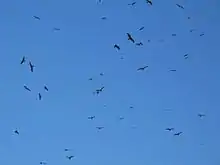
Passage migrants include Nycticorax nycticorax, Ardeola ralloides, Ardea purpurea, Plegadis falcinellus, Pandion haliaetus, Falco vespertinus, Milvus migrans, Circus pygargus, Hieraaetus pennatus, Himantopus himantopus, Glareola pratincola, Calidris temminckii, Tringa stagnatilis, Larus audouinii, Gelochelidon nilotica, Chlidonias leucopterus, Chlidonias hybridus, Coracias garrulus, Anthus cervinus, Plegadis falcinellus, Oenanthe isabellina and Oenanthe pleschanka.
Vagrant birds (many from nearby Turkey) include Circus macrourus, Charadrius leschenaultii, Apus affinis, Luscinia luscinia, Merops persicus, Ficedula semitorquata, Oenanthe cypriaca, Sturnus roseus, Hoplopterus spinosus, Emberiza rustica, Chettusia gregaria, Bubulcus ibis, Anthropoides virgo, Passer moabiticus and very many others.
Melanocorypha calandra and Acrocephalus melanopogon are amongst winter visitors on Rhodes.
.jpg.webp)
Mammals
There are 33 species: Cervidae Dama dama; Erinaceidae Erinaceus concolor, Erinaceus roumanicus; Leporidae Lepus europaeus, Oryctolagus cuniculus; Molossidae Tadarida teniotis; Muridae Apodemus flavicollis, Apodemus mystacinus, Apodemus sylvaticus, Mus domesticus, Rattus rattus; Mustelidae Martes foina, Meles meles; Phocidae Monachus monachus; Rhinolophidae Rhinolophus blasii, Rhinolophus euryale, Rhinolophus ferrumequinum, Rhinolophus hipposideros; Soricidae Crocidura suaveolens, Suncus etruscus; Vespertilionidae Eptesicus bottae, Hypsugo savii, Miniopterus schreibersii, Myotis blythii, Myotis emarginatus, Myotis myotis, Pipistrellus kuhlii, Pipistrellus pipistrellus, Plecotus austriacus.
Amphibia
Rhodes has 3 species: Bufo viridis, Hyla arborea and Rana cerigensis.
Reptiles
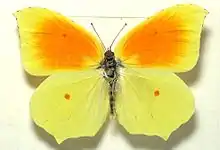
There are 24 species of reptile certainly found on Rhodes. These are: Amphisbaenidae, Blanus strauchi; Cheloniidae, Caretta caretta;Geoemydidae Mauremys rivulata; Colubridae, Platyceps najadum, Coluber caspius, Coluber gemonensis, Coluber nummifer, Elaphe situla, Natrix natrix, Natrix tessellata, Telescopus fallax; Dermochelyidae, Dermochelys coriacea; Lacertidae, Podarcis erhardii,Anatololacerta oertzeni, Ophisops elegans Lacerta trilineata; Scincidae, Ablepharus kitaibelii, Chalcides ocellatus, Euprepis auratus ; Typhlopidae, Typhlops vermicularis; Viperidae, Vipera xanthina; Agamidae, Stellagama stellio; Gekkonidae, Hemidactylus turcicus and Mediodactylus kotschyi.
Species uncertainly recorded include a further 8: Eryx jaculus, Eirenis modestus, Malpolon monspessulanus, Natrix tessellata, Vipera xanthina, Chamaeleo chamaeleon, Testudo graeca and Testudo hermanni.
Fish
See List of fish of the Mediterranean Sea. Squalius ghigii is endemic to Rhodes.
Insects
2,652 insect species/subspecies are recorded from Rhodes. Commonly seen insects in Rhodes are the sail swallowtail, the scarlet dragonfly, Cleopatra butterfly, European praying mantis, cicada, glow-worm, hummingbird hawk-moth, firebug, field cricket, European tree cricket, European hornet, cuckoo wasp, carpenter bee and the rose chafer.
Land and freshwater mollusca
178 land and freshwater mollusca species/subspecies are recorded from Rhodes.
Other terrestrial invertebrates
The freshwater crab Potamon potamios is found on Rhodes. It is common at Petaloudes.
Marine fauna
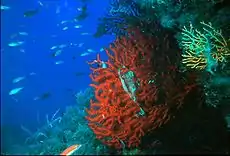
Characteristic habitat types of the Rhodes Mediterranean/Aegean coastal zone, are the Cystoseira biocenosis and the Posidonia oceanica seagrass beds, Lithophyllum lichenoides communities form coralligenous reefs which are a spectacular sight; the coralline alga is covered with large gorgonian fans, coral, and a diverse array of often colourful invertebrate organisms and hundreds of species of fish.
These communities host sponges (Porifera), sea anemones, jellyfish (Cnidaria), sea mats and hornwrack (Bryozoa), segmented worms (Annelida) snails, bivalves, squids and octopuses (Mollusca), starfishes and sea urchins (Echinodermata), crabs, lobsters and shrimps (Arthropoda) and little known groups such as Echiura, Priapulida, Sipuncula, Brachiopoda, Pogonophora, Phoronida and Hemichordata.
Amongst the thousand or so species of invertebrates found in the Rhodes Mediterranean/Aegean coastal zone marine environment are mantis shrimps, Mediterranean slipper lobsters, octopus, cuttlefish, scribbled nudibranch, Hypselodoris picta, tasselled nudibranch, precious coral, zigzag coral, purple sail, Mediterranean jellyfish, spiny spider crab, circular crab, broad-clawed porcelain crab, noble pen shell, pilgrim’s scallop, ragged sea hare, violet sea hare, Portuguese man o' war, black sea urchin, purple sea-urchin, long-spine slate pen sea urchin, Mediterranean starfish, sea mouse, Barbatia barbata and Parazoanthus axinellae.
Museums
There is a marine natural history display at the Aquarium of Rhodes together with a display of living Mediterranean fish and other marine creatures. A second natural history display at Petaloudes is devoted to the mammals, birds, reptiles, insects, plants and geology of Rhodes. A more specialised museum devoted to bee keeping is close to Rhodes city).
.jpg.webp) Rhodes Aquarium
Rhodes Aquarium.jpg.webp) Museum of Rhodes Aquarium, smooth hammerhead shark
Museum of Rhodes Aquarium, smooth hammerhead shark.jpg.webp) Nature Museum Petaloudes. A display case.
Nature Museum Petaloudes. A display case. A display case.
A display case. Bee Museum Rhodes.
Bee Museum Rhodes..jpg.webp) Bee Museum. A small section of the extensive displays.
Bee Museum. A small section of the extensive displays.
.jpg.webp)
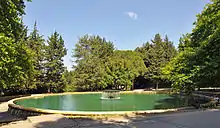
.
Conservation
Greece is a signatory to the Berne Convention on the Conservation of European Wildlife and Natural Habitats and the Habitats Directive both affording protection to the fauna and flora of Rhodes.
References
Flora
- Flora Europaea
- Vangelis Papiomytoglou, 2006 Wild Flowers of Greece Mediterraneo Editions ISBN 960-8227-74-7
- Panitsa, Maria, Britt Snogerup, Sven Snogerup & Dimitrios Tzanoudakis, 2003. Floristic investigation of Lemnos island (NE Aegean area, Greece). - Willdenowia 33: 79 - 105.
Orchids
- Kretzschmar, H. and G., 2004 Orchids - Crete and Dodecanese Mediterraneo Editions, Greece ISBN 9608227429
- Kreutz, C. A. J., 2002 Die Orchideen von Rhodos und Karpathos : Beschreibung, Lebensweise, Verbreitung, Gefährdung, Schutz und Ikonographie ( the orchids of Rhodes and Karpathos : description, pattern of life, distribution, threat, conservation and iconography) Seckel & Kreutz Publishers. ISBN 90-805149-2-6
- Zissis Antonopoulos, 2009 The Bee Orchids of Greece - The genus Ophrys Mediterraneo Editions ISBN 978-960-6848-23-0
- Orchids of Europe includes spring expedition report Frühling auf Rhodos 20. - 30. März 2008 pdf in German
Birds
- The Birds of the Western Palearctic and Avibase see External links
- The EBCC Atlas of European Breeding Birds
Reptiles
Butterflies
- Bender, R., 1963 Beitrage zur Lepidopterenfauna der Insel Rhodos Zeitschr. wiener e.nt. Ges., vo1.48: pp.1l-20, 2 pIs. 1963. Review of previous studies& annotated list of 150 macros from Rhodes. Figures races of Gonepteryx cleopatra (in colour), Maniola telmessia ornata, & Glaucopsyche alexis insulicola. In German.
- Kudrna, O. 2002. The Distribution Atlas of European Butterflies. Oedippus, Nr. 20.
- Kudrna, O., Harpke, A., Lux, K., Pennerstorfer, J., Schweiger, O.,Settele, J. & Wiemers, M., 2011. Distribution Atlas of Butterflies in Europe. GfS, Halle, Germany. 576 pp.
- Van Swaay, C., Cuttelod., A., Collins, S., Maes, D., López Munguira, M., Šašiæ, M., Settele, J., Verovnik, R., Verstrael, T., Warren, M., Wiemers, M. and Wynhoff, I., 2010. European Red List of Butterflies.
Mollusca
- Frank C., 1997. Die Molluskenfauna der Insel Rhodos, 2. Teil. Stapfia, 48: 1–179.
- Maassen, W.J.M., 1981. De Molluskenfauna van het griekseeiland Rhodos. De Kreukel, 17: 21–32.
- Paget O.E., 1976. Die Molluskenfauna der Insel Rhodos. 1.Teil. Annalen des Naturhistorischen Museums in Wien 80:681–780.
- Barna Páll-Gergely and Zoltán Csabai, 2008. Notes on the continental malacofauna of Rhodes, with two new species for the fauna of the island Malacologia Bohemoslovaca 7: 76–78
- Fauna Europaea
Insects
Marine life
- Noelle and Dinos Simeonidis, 2010 Life in the Greek seas and the Mediterranean Mediterraneo Editions ISBN 978-960-6848-25-4
- Repetto, G.; Orlando, F. & Arduino, G. 2005. Conchiglie del Mediterraneo. 1770 Specie Illustrate con Distribuzione e Frequenza. Amici del Museo Federico Eusebio, Alba. 392 pp.
External links
- WWF Southeastern Europe
- Hellenic Zoological Society
- Fauna Europaea Fauna of Dodecanese lists via search
Birds
Flora
- Michael HasslerUniversity of Karlsruhe
- EU-Nomen Pan-European Species Directories Infrastructure To access the East Aegean list go to advanced search > occurrence then select East Aegean from the menu
- Mediterranean plants identification University of Reading
- Orchids of Rhodes
- East Mediterranean Ecosystems
Natura Mediterraneo
- naturamediterraneo Forum. Many images In Italian
.jpg.webp)
.JPG.webp)
